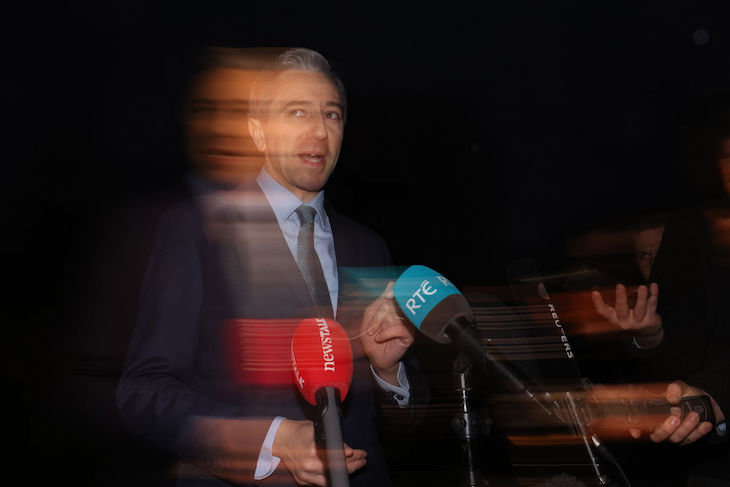Will the elections taking place across Ireland today result in a whole new government? Not really, is the conclusion most Irish citizens seem to be coming to. ‘It’ll be the same two main parties in government – nothing will change,’ one hospitality manager notes reluctantly, nodding to the current three-party coalition in the Dáil of the centre-right Fine Gael and Fianna Fáil with the left-wing Greens. ‘Ireland likes a moderate government,’ another voter added. ‘Anything that’s not radical.’
Fine Gael has suffered an exodus of longstanding politicians
The current Taoiseach, Fine Gael’s Simon Harris, saw his popularity soar by 17 points to 55 per cent just months after he replaced Leo Varadkar in March. His party is expected to take enough seats to enter into another coalition with Micheál Martin’s Fianna Fáil – and with the number of seats in the Dáil increasing to 174, a third party will likely be needed again to reach the required government-forming majority of 88. Frustration about the lack of housing and calls for childcare and health service reforms are key priorities in this poll, while immigration remains a bugbear across the country – something independent contenders have been keen to capitalise on. And so while voters may not expect an entirely new government set-up, the progress made by smaller parties will be much more telling about the shift in the electorate’s mood.
For their part, Harris’s lot is not expected to outdo their last result: widespread cynicism about the current Irish government and politicians in general has led to concerns of the impact of voter apathy on this poll. Despite the Taoiseach’s positive personal ratings, Fine Gael has suffered an exodus of longstanding politicians and is leaning heavily on Harris’s personal ratings, opting instead for a presidential-style campaign which splashes Harris’s face most prominently across its signage. Whether it is working is a different matter: the final Ipsos B&A poll for the Irish Times puts Fine Gael in third place with voters on 19 per cent, down six points, while support for Sinn Féin and Fianna Fáil has jumped by a point or two respectively.
Opposition politicians and dissatisfied voters have sniffed at the current government’s ‘glitterball’ budget, announced only a month before Harris called the snap poll. ‘The handouts are there to sway people,’ says a bartender in Dublin’s Temple Bar district. ‘It’s given folk a pre-election boost so they’ll vote favourably, but it’s full of one-offs. They’ve promised to better address the concerns of the [hospitality] industry – if they get back in.’ Fears of a low turnout are regularly heard in grumblings about the timing of the election, with the three-week long campaign period regularly cited as a reason for the lack of engagement from both voters and parties. ‘I’ve only had Fianna Fáil leaflets through my door,’ laments one voter, while Dubliners remark on how the campaign efforts of independents are more noticeable than those of mainstream groups.
And there are certainly some interesting independent candidates running, with the capital city alone offering voters a fascinating selection. In Dublin Central, constituents have the option to back convicted criminal Gerry Hutch, currently bailed from a Lanzarote jail, who has, with a degree of irony, called for better policing and more guards. Although an unlikely candidate, it is thought ‘The Monk’ could perform well with the city’s socially deprived communities fed up with the status quo. Former MEP Clare Daly is also competing in the constituency against Sinn Féin leader Mary Lou McDonald as a left-wing independent. Given her high profile and general likeability, it is thought she too could hoover up a lot of the area’s anti-establishment vote.
Meanwhile right-wing groups are approaching this election with more strategy than in previous polls: social media has become key, with activists regularly posting on Telegram channels to help corral support for their candidates. Several parties heralding the ‘Ireland for the Irish’ slogan have also come together under the National Alliance umbrella so as not to split the right-wing vote in each constituency. Not that everything has gone without a hitch. The anti-immigration movement recently faced pressure after a bizarre fallout over the ownership of €400,000 (£330,000) of gold bars saw National Party leader Justin Barrett quickly ousted. He has now formed a rival far-right group, Clann Éireann.
Smaller parties and independents are expected to benefit from a growing resentment towards mainstream politicians in the Emerald Isle. The Greens have been lauded for their contributions in government, while Ireland’s Labour party has been described by political lecturer Professor Gary Murphy as ‘bullish’ about their prospects. Some minority parties have floated the idea of forming a left-wing bloc to enter the Dáil in coalition with Fine Gael, but the Taoiseach has already rubbished the idea of a six-party coalition.
Sinn Féin is interested in the proposal – but it is not thought likely that, if it came to it, the smaller far-left parties would be all that keen to join forces with McDonald’s lot. Her party performed well in this year’s local elections, but support for the progressive group has more recently stagnated and it is thought unlikely Sinn Féin will get near government this year.
The dissatisfaction with mainstream politicians has been a defining element of this election campaign and ultimately the real story of this election will lie with the small political parties and the gains – or losses – they make. The outcome of today’s vote may not change Ireland’s political set-up all that much, but its citizens certainly don’t want things to remain the same. Housing, homelessness and the perception of a declining quality of life are issues that have plagued the outgoing government and they will continue to present significant challenges for the next. The lack of progress made on these issues by Ireland’s new government after this election will only serve to embolden the country’s colourful cast of independents at the next.








Comments